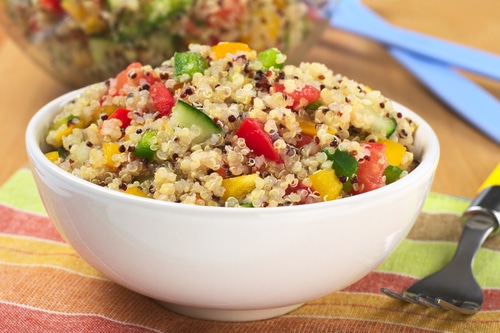
1. Non-Dairy Milk. Think soy milk, almond milk, or coconut milk. A simple cup of soy or almond milk will contribute about 9 grams of protein to your daily intake. If you’re not a big milk fan, adding some to some cereal or using some while cooking is an easy way to consume it.
2. Nut Butter. A couple of tablespoons of either peanut butter, almond butter, or cashew butter will easily get you 8 grams of protein. Raw or dry roasted nut butters are best because of how high they are in calories. You can add these into vegan pancakes or cookies, or you can dip fruits into some for a healthy and protein-packed snack. These are great for after a workout and are easily located at any grocery store.
3. Vegetables. All green veggies will add some more protein to your day. This can include spinach, edamame, broccoli, kale, chickpeas, and green peas. Protein levels will fluctuate depending on which vegetables you choose to eat. All of these veggies mentioned and more are easily located at your local grocery store.
4. Quinoa. This is a fantastic seedy grain! Some people consider it the perfect or complete protein because a cup will get you 8 grams of protein, 9 grams of fiber, and 9 essential amino acids. This goes great in a soup, tossed in a salad, or with brown sugar and fruit as a substitute for a morning bowl of cereal. Buying whole grains such as this are easy to purchase in bulk at about $1.50 per pound.
5. Beans and Lentils. These are super protein-packed. A cup of kidney or black beans will contribute about 15 grams of protein to your diet. And you can buy beans in any number of ways while still getting high amounts of protein. Canned beans, freshly picked beans, or dried beans will all be high in protein. One cup of cooked lentils contains 18 grams of protein. Lentils are great in veggie burgers, casseroles, and rice dishes. These can all be found at your local grocery store.
6. Tempeh, Seitan, Veggie Burgers, and Tofu. One cup of tempeh will get you 30 grams of protein, a cup of tofu will get you 40 grams, and a cup of seitan has 72 full grams of protein! These are great because they are sponge-like in that they will suck up the flavor of anything you cook it with. These can also be mashed up like potatoes or eaten firm. Many people who do not like tofu like how tempeh tastes. Seitan is a great poultry substitute in any recipe. Any mock meats such as veggie burgers are great at barbecues and are extremely filling.
7. Seeds. Like many nuts, seeds are high in proteins and healthy fats. Easy ones to eat are sunflower seeds, chia seeds, poppy seeds, flax seeds, or sesame seeds. These will go well in homemade bread, stirred into morning cereals, or in salad dressings.
8. Sprouted-Grain Bread. You can easily get 10 grams of protein from a slice of this bread. It is great for making sandwiches with any nut butter or a plethora of veggies.
9. Unsweetened Cocoa Powder. This is the type you would use for baking; one tablespoon will contain about one gram of protein. While this powder is very bitter, adding sugars and fat (such as almond milk) will offset the taste. It will make a great hot chocolate treat and can be found at any local grocery store in the baking goods aisle.
While getting your protein as a vegan or vegetarian may seem difficult, it’s a very easy thing to integrate. You don’t have to follow the traditional protein options either. Incorporating these protein-packed foods into your diet will help you continue your lifestyle choice in a healthy way.

